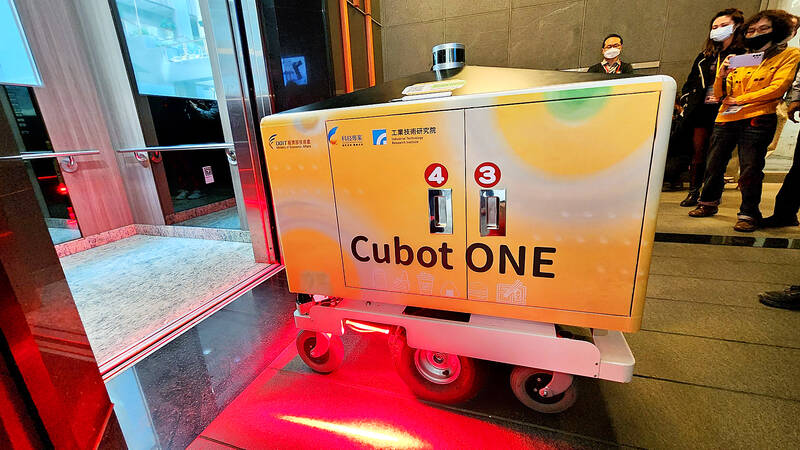A vehicle dubbed “Taiwan’s first food courier robot” is to undergo a 10-month trial at the Kaohsiung Software Park (高雄軟體園區) from Wednesday next week, the Industrial Technology Research Institute (ITRI, 工研院) said yesterday.
While robots supplementing waiters at restaurants is not unheard of, the autonomous mobile robot, also known as Cubot ONE, is set apart by its ability to deliver food to workers in nearby offices, the government-funded institute said in a statement.
Cubot ONE would be deployed at the park’s 7-Eleven convenience store, from where it would deliver orders placed by workers in the park’s three office buildings, the institute said.

Photo: CNA
The institute first unveiled the robot at the Meet Greater South expo in Kaohsiung last year, after which the Cubot ONE’s developers spent six months upgrading it, said Chang Neng-kai (張能凱), a senior specialist in the Ministry of Economic Affairs’ Department of Industrial Technology.
Cubot ONE can weave its way through crowded spaces, and enter and exit elevators, Chang said.
Cubot ONE would deliver orders placed through 7-Eleven’s Foodomo food delivery platform, he said.
Global robot sales have been growing in the past few years, with logistics robots accounting for 34 percent of overall sales, Chang said.
Global production value of robot sales is expected to reach US$49.4 billion in 2027, he said.
Cubot ONE would mark the latest example of artificial intelligence applications in the ministry’s Taiwan Startup Terrace technology cluster in New Taipei City’s Linkou District (林口), after the ministry conducted successful trials of uncrewed aerial vehicles and autonomous ships, Chang said.
Chang said he hopes that Cubot ONE would operate in “smart” stores, hotels and restaurants in the future.
Powered by cellular-vehicle-to-everything technology, wireless Internet connectivity, 3D positioning, a navigation system and a patented chassis, Cubot ONE can receive orders, navigate through traffic, circumvent or surmount obstacles and send notifications to customers, ITRI executive vice president Chang Pei-zen (張培仁) said.
Cubot ONE is expected to save workers in the park an average of 10 to 15 minutes per order, the institute said.

Taiwan’s exports soared 56 percent year-on-year to an all-time high of US$64.05 billion last month, propelled by surging global demand for artificial intelligence (AI), high-performance computing and cloud service infrastructure, the Ministry of Finance said yesterday. Department of Statistics Director-General Beatrice Tsai (蔡美娜) called the figure an unexpected upside surprise, citing a wave of technology orders from overseas customers alongside the usual year-end shopping season for technology products. Growth is likely to remain strong this month, she said, projecting a 40 percent to 45 percent expansion on an annual basis. The outperformance could prompt the Directorate-General of Budget, Accounting and

The demise of the coal industry left the US’ Appalachian region in tatters, with lost jobs, spoiled water and countless kilometers of abandoned underground mines. Now entrepreneurs are eyeing the rural region with ambitious visions to rebuild its economy by converting old mines into solar power systems and data centers that could help fuel the increasing power demands of the artificial intelligence (AI) boom. One such project is underway by a non-profit team calling itself Energy DELTA (Discovery, Education, Learning and Technology Accelerator) Lab, which is looking to develop energy sources on about 26,305 hectares of old coal land in

Netflix on Friday faced fierce criticism over its blockbuster deal to acquire Warner Bros Discovery. The streaming giant is already viewed as a pariah in some Hollywood circles, largely due to its reluctance to release content in theaters and its disruption of traditional industry practices. As Netflix emerged as the likely winning bidder for Warner Bros — the studio behind Casablanca, the Harry Potter movies and Friends — Hollywood’s elite launched an aggressive campaign against the acquisition. Titanic director James Cameron called the buyout a “disaster,” while a group of prominent producers are lobbying US Congress to oppose the deal,

Two Chinese chipmakers are attracting strong retail investor demand, buoyed by industry peer Moore Threads Technology Co’s (摩爾線程) stellar debut. The retail portion of MetaX Integrated Circuits (Shanghai) Co’s (上海沐曦) upcoming initial public offering (IPO) was 2,986 times oversubscribed on Friday, according to a filing. Meanwhile, Beijing Onmicro Electronics Co (北京昂瑞微), which makes radio frequency chips, was 2,899 times oversubscribed on Friday, its filing showed. The bids coincided with Moore Threads’ trading debut, which surged 425 percent on Friday after raising 8 billion yuan (US$1.13 billion) on bets that the company could emerge as a viable local competitor to Nvidia